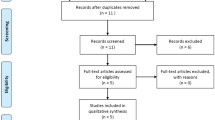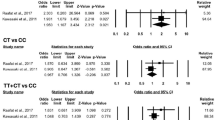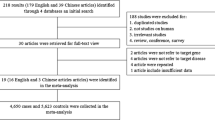Abstract
Many case–control studies have investigated the role of TGF-β1 gene +869C/T promoter polymorphism in autoimmune diseases, but the results are inconsistent. To clarify this point, we performed a meta-analysis based on all available studies in Pubmed, Elsevier Science Direct, Google Searching, Chinese Biomedical Literature Database, Chinese National Knowledge Infrastructure. Crude odds ratios (ORs) with 95 % confidence intervals were calculated to estimate the strength of the association. A fixed or random effects model was used on the basis of heterogeneity. A total of 21 papers including 2,693 cases and 3,036 controls were considered in the current meta-analysis. These studies encompass two ankylosing spondylitis (AS), eight rheumatoid arthritis (RA), four systemic lupus erythematosus (SLE), and seven systemic sclerosis (SSc). The results showed that TGF-β1 +869C/T promoter polymorphism were associated with susceptibility to RA (CC vs. TT: OR = 0.65, 95 % CI = 0.48–0.88, P = 0.005; CC vs. CT + TT: OR = 0.56, 95 % CI = 0.45–0.69, P = 0.000; C vs. T: OR = 0.81, 95 % CI = 0.71–0.93, P = 0.003). When stratified by race, significant association was observed only in Asian population. However, we failed to reveal the association between this gene promoter polymorphism and AS, SLE, and SSc. Therefore, this meta-analysis suggests a possible association between TGF-β1 +869C/T promoter polymorphism and RA, especially in Asian population.



Similar content being viewed by others
References
Marrack P, Kappler J, Kotzin BL (2001) Autoimmune disease: why and where it occurs. Nat Med 7:899–905
Wandstrat A, Wakeland E (2001) The genetics of complex autoimmune diseases: non-MHC susceptibility genes. Nat Immunol 2:802–809
Becker KG (2004) The common variants/multiple disease hypothesis of common complex genetic disorders. Med Hypotheses 62:309–317
Massague J (1990) The transforming growth factor-beta family. Annu Rev Cell Biol 6:597–641
Fujii D, Brissenden JE, Derynck R et al (1986) Transforming growth factor beta gene maps to human chromosome 19 long arm and to mouse chromosome 7. Somat Cell Mol Genet 12(3):281–288
Aoki CA, Borchers AT, Li M et al (2005) Transforming growth factor beta (TGF-beta) and autoimmunity. Autoimmun Rev 4(7):450–459
Haukim N, Bidwell JL, Smith AJ et al (2002) Cytokine gene polymorphism in human disease: on-line databases. Genes Immun 3(Suppl 2):313–330
Howe HS, Cheung PL, Kong KO et al (2005) Transforming growth factor beta-1 and gene polymorphisms in oriental ankylosing spondylitis. Rheumatology (Oxford) 44(1):51–54
van der Paardt M, Crusius JB, García-González MA et al (2005) Susceptibility to ankylosing spondylitis: no evidence for the involvement of transforming growth factor beta 1 (TGFB1) gene polymorphisms. Ann Rheum Dis 64(4):616–619
Alayli G, Kara N, Tander B et al (2009) Association of transforming growth factor β1 gene polymorphism with rheumatoid arthritis in a Turkish population. Jt Bone Spine 76:20–23
Panoulas VF, Douglas KMJ, Smith JP et al (2009) Transforming growth factor-β1 869T/C, but not interleukin-6 174G/C, polymorphism associates with hypertension in rheumatoid arthritis. Rheumatology 48:113–118
Sugiura Y, Niimi T, Sato S et al (2002) Transforming growth factor beta 1 gene polymorphism in rheumatoid arthritis. Ann Rheum Dis 61:826–828
Pokorny V, Chau J, Wu L et al (2003) Transforming growth factor beta 1 gene (HSTGFB1) nucleotide T869C (codon10) polymorphism is not associated with prevalence or severity of rheumatoid arthritis in a caucasian population. Ann Rheum Dis 62:907–908
Wang YP, Xiao LS, Zhou Y et al (2007) Gene polymorphisms of transforming growth factor-β1 with rheumatoid arthritis. Chin J Public Health 11:1405–1406
Zhu Y, Liu F, Zhang F et al (2006) Correlation of transforming growth factor-β1 T869C polymorphism and rheumatoid arthritis in Chinese population. Jiangsu Med J 32:1112–1114
Li YY (2011) To investigate relationship of the polymorphisms of TGF-β1 in patients with rheumatoid arthritis. Zhengzhou University
Kim SY, Han SW, Kim GW et al (2004) TGF-beta1 polymorphism determines the progression of joint damage in rheumatoid arthritis. Scand J Rheumatol 33:389–394
Wang B, Morinobu A, Kanagawa S et al (2007) Transforming growth factor beta 1 gene polymorphism in Japanese patients with systemic lupus erythematosus. Kobe J Med Sci 53(1–2):15–23
Guarnizo-Zuccardi P, Lopez Y, Giraldo M et al (2007) Cytokine gene polymorphisms in Colombian patients with systemic lupus erythematosus. Tissue Antigens 70(5):376–382
Lu LY, Cheng HH, Sung PK et al (2004) Single-nucleotide polymorphisms of transforming growth factor-beta 1 gene in Taiwanese patients with systemic lupus erythematosus. J Microbiol Immunol Infect 37(3):145–152
Lu LY, Cheng HH, Sung PK et al (2005) Tumor necrosis factor-beta +252A polymorphism is associated with systemic lupus erythematosus in Taiwan. J Formos Med Assoc 104(8):563–570
Beretta L, Cappiello F, Moore JH et al (2008) Ability of epistatic interactions of cytokine single-nucleotide polymorphisms to predict susceptibility to disease subsets in systemic sclerosis patients. Arthritis Rheum 59(7):974–983
Büyük U, Ates O, Dalyan L et al (2010) Analysis of transforming growth factor beta 1 (TGF-beta1) gene polymorphisms in Turkish patients with scleroderma. Cell Biochem Funct 28(4):274–277
Crilly A, Hamilton J, Clark CJ et al (2002) Analysis of transforming growth factor beta 1 gene polymorphisms in patients with systemic sclerosis. Ann Rheum Dis 61(8):678–681
Lee EB, Kim JY, Lee YJ et al (2004) Transforming growth factor-beta 1 polymorphisms in Korean patients with systemic sclerosis. Tissue Antiqens 63(5):491–495
Ohtsuka T, Yamakage A, Yamazaki S (2002) The polymorphism of transforming growth factor-β1 gene in Japanese patients with systemic sclerosis. Br J Dermatol 147(3):458–463
Suqiura Y, Banno S, Matsumoto Y et al (2003) Transforming growth factor beta 1 gene polymorphism in patients with systemic sclerosis. J Rheumatol 30(7):1520–1523
Zhou X, Tan FK, Stivers DN et al (2000) Microsatellites and intragenic polymorphisms of transforming growth factor beta and platelet-derived growth factor and their receptor genes in native Americans with systemic sclerosis (scleroderma): a preliminary analysis showing no genetic association. Arthritis Rheum 43(5):1068–1073
Cochran WG (1954) The combination of estimates from different experiments. Biometrics 10:101–129
Higgins JP, Thompson SG (2002) Quantifying heterogeneity in a meta-analysis. Stat Med 21:1539–1558
DerSimonian R, Laird N (1986) Meta-analysis in clinical trials. Control Clin Trials 7:177–188
Egger M, Davey SG, Schneider M et al (1997) Bias inmeta-analysis detected by a simple, graphical test. Br Med J 315:629–634
Grainger DJ, Mosedale DE, Metcalfe JC (2000) TGF-beta in blood: a complex problem. Cytokine Growth Factor Rev 11(1–2):133–145
Grainger DJ, Heathcote K, Chiano M et al (1999) Genetic control of the circulating concentration of transforming growth factor type beta 1. Hum Mol Genet 8(1):93–97
Kehrl JH (1991) Transforming growth factor-beta: an important mediator of immunoregulation. Int J Cell Cloning 9:438–450
Dang H, Geiser AG, Letterio JJ et al (1995) SLE-like autoantibodies and sjogren’s syndrome-like lymphoproliferation in TGF-beta knockout mice. J Immunol 155:3205–3212
Trikalinos TA, Salanti G, Khoury MJ et al (2006) Impact of violations and deviations in Hardy–Weinberg equilibrium on postulated gene-disease associations. Am J Epidemiol 163:300–309
Acknowledgments
This work was partly supported by the Natural Science Foundation of Anhui Province (1308085MH169), the Key Project of the Education Department of Anhui Province Natural Science Research (KJ2012A165), Annual Plan Aid Fund of Anhui Provincial Finance Department, and Medical Research Fund of Anhui Provincial Health Department (2010C103).
Conflict of interest
None.
Author information
Authors and Affiliations
Corresponding author
Additional information
Li Zhang and Jun-wei Yan contributed equally to this work, and co-first authors.
Rights and permissions
About this article
Cite this article
Zhang, L., Yan, Jw., Wang, YX. et al. Association of TGF-β1 +869C/T promoter polymorphism with susceptibility to autoimmune diseases: a meta-analysis. Mol Biol Rep 40, 4811–4817 (2013). https://doi.org/10.1007/s11033-013-2577-4
Received:
Accepted:
Published:
Issue Date:
DOI: https://doi.org/10.1007/s11033-013-2577-4




